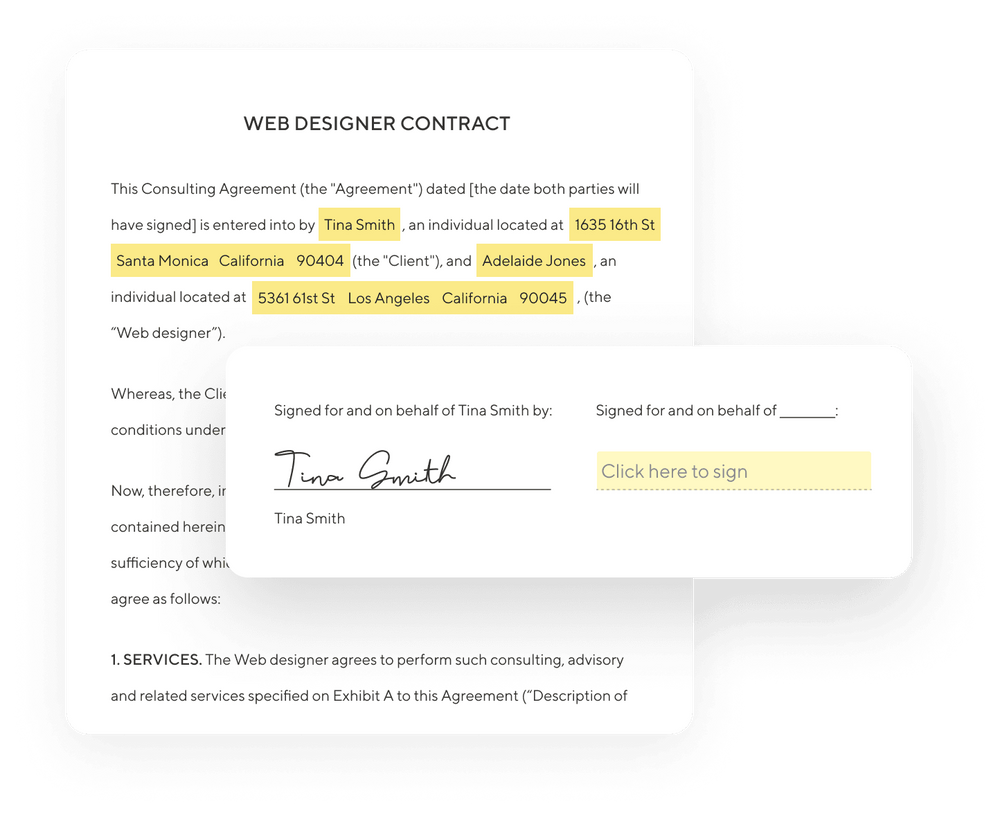You may be asked as a freelancer to sign a non-compete or non-disclosure agreement (NDA) by a customer at some point. As a freelancer, it's crucial to be aware of these contracts and how they may affect your job. This article will introduce you to non-disclosure agreements (NDAs) and non-compete agreements (NCAs), explain why and how they affect independent contractors, and provide tactics for negotiating favorable terms.
We'll also discuss potential options for freelancers and answer frequently asked concerns regarding such contracts. If you are a freelancer, whether you are just starting out or have been doing it for a while, you will find this article to be a helpful resource.
What exactly is a non-disclosure agreement (NDA)?
One party (the disclosing party) provides secret information to the other party (the receiving party), and the receiving party promises not to reveal the information to any third parties without the prior consent of the disclosing party. Businesses often employ non-disclosure agreements (NDAs) to safeguard confidential information to protect trade secrets, R&D results, and financial records. This is important for protecting their business interests.
These may be called a confidential disclosure agreement or another name, but the effect is the same. They can be written to apply to every current or former employee, freelancer, and contractor employed by a company.
NDAs may either be reciprocal or one-sided:
- Reciprocal: When both parties are giving sensitive information to one another and agree to maintain the secrecy of such information, a mutual NDA is employed.
- One-sided: When just one party (the disclosing party) is providing sensitive information to the other party (the receiving party), yet only the receiving party is bound by a duty of confidentiality, a one-way NDA is employed.
A non-disclosure agreement (NDA) is an agreement between two parties that prohibits one party from revealing the other party's sensitive information to any third party without the approval of the disclosing party. By limiting the exposure of confidential information, an NDA may help a company keep a leg up on the competition.
Business plans, client lists, marketing strategies, technical data, and financial information are all examples of the types of information that might benefit from being covered by a non-disclosure agreement. Confidential information, such as a person's medical or financial data, may also be shielded by an NDA.
The term of a non-disclosure agreement (NDA) is subject to the specifics of the sensitive information released and the agreement's stated purpose. Both short-term (three-year) and long-term (indefinite) NDAs are possible. Given the nature of the secret information and the parties' business connection, a fair and suitable term for an NDA is one that protects both parties' interests.
A freelancer may use an NDA to protect their intellectual property. Such an agreement would prevent a company from using the freelancer's work and ideas without proper pay and credit.

What is a non-compete clause?
A non-compete agreement, also known as a covenant not to compete, is a legal contract in which one party (typically an employee or contractor) agrees not to compete with the other party (typically the employer) within a certain geographic area and for a certain period of time after the employment or contracting relationship ends.
When an employee or contractor signs a non-compete agreement, they agree not to use the employer's trade secrets, client list, or other proprietary information in any way that might benefit a competitor after their employment or contractual relationship has ended. The primary purpose of most non-compete agreements is to safeguard a company's proprietary information, including its trade secrets, brand name, and customer base.
Both the geographic region and the sectors or kinds of companies in which the employee or contractor is barred from competing are often included in the scope of a non-compete agreement. A non-compete clause may prohibit an employee from working for a rival in the same industry or from beginning a similar firm within a set distance of the employer's location.
The time frame covered by a covenant not to compete is also crucial. Both the duration and the territory covered by a non-compete agreement should be acceptable. A non-compete agreement that is unduly broad or stringent may be unenforceable in court.
It is important to note that non-compete agreements tend to be more divisive and less prevalent than non-disclosure agreements. Laws governing the enforceability of non-compete agreements vary from one state to the next, with some jurisdictions, like California, placing stricter limits on their usage. Therefore, non-compete agreements' enforceability might vary greatly from one state to the next.
The implications of NDAs and non-compete clauses for independent contractors
Freelancers are sometimes required by clients to sign non-disclosure and non-compete agreements before beginning work for them. Realize how these contracts may limit your capacity to take on new customers or seek new possibilities.
Some of these agreements, especially regarding competition, can unfairly limit worker mobility. They prevent you from working for someone else in the same industry as your former employer. Some state laws make non-competes much harder to enforce, so you should check the laws for advice about your specific geographic location.
Some important things for independent contractors to think about before signing non-disclosure and non-compete agreements are as follows:
Be clear on what is and isn't covered by the NDA or non-compete, as well as how long the agreement will be in effect and whether or not it imposes any geographical or industry-specific limits.
Non-disclosure and non-competition agreements (NDAs and NCAs) may have a chilling effect on your capacity to engage with other customers or seek possibilities in specific sectors or locations. The agreement's terms and their possible effect on your company should be weighed against the nature of your freelancing work to see whether it's a good fit.
Whether or not a non-disclosure or non-compete agreement is enforceable depends on the state in which you are employed and the provisions of the agreement itself. Whether or not these agreements may be enforced in court and what effect they may have on your rights as a freelancer are crucial considerations.
Independent contractors should be aware of the potential effects of non-disclosure and non-compete agreements. Successfully navigating these intricate legal concerns as a freelancer depends on your familiarity with these agreements and your diligence in safeguarding your rights.

Freelancing with confidentiality agreements
If you're a freelancer, you can be asked to sign non-compete agreements or a non-disclosure agreement that you're not happy with. Remember that you have the right to negotiate the terms of these agreements if you find yourself in such a position. If you're a freelancer looking to negotiate a non-disclosure or non-compete agreement, here are some tactics to keep in mind:
- Consult a lawyer: If you are faced with a non-disclosure or non-compete agreement (NDA/NCA) that you are unfamiliar with, it may be in your best interest to consult with a lawyer who specializes in business law or employment law. In the presence of legal counsel, you may get insight into the ramifications of the agreement and receive guidance on how to proceed. They can also tell you how companies enforce non-compete agreements.
- The agreement's scope should be negotiated; NDAs and non-compete clauses, for example, may cover a wide variety of topics and actions. You might attempt to negotiate more restricted or precise terms if the agreement's scope seems too wide to you. It's possible to negotiate the specifics of a non-disclosure or non-compete agreement, such as excluding particular categories of information or limiting the region or duration of coverage.
- Alternatives to non-disclosure and non-compete agreements should be considered. You may wish to look into other legal protections if you are uncomfortable with the provisions of a non-disclosure or non-compete agreement. Some alternatives to the standard employment contract include the usage of a secrecy provision in freelancing contracts, independent contractor agreements, and work-for-hire agreements.
- You have the right to refuse to sign a non-disclosure or non-compete agreement (NDA or NCA) if you are unable to negotiate a more advantageous arrangement or locate an alternative to the agreement. Keep in mind that as a freelancer, you are your own boss and may pick and choose whatever customers and projects you want to work on. You shouldn't feel obligated to sign a non-disclosure or non-compete agreement (NDA/NCA) if doing so isn't in your best interests.
Remember that as a freelancer, you have the legal right to bargain over the details of any non-disclosure or non-compete agreements that may be required of you. Taking charge of your career as a freelancer requires you to know your rights and be willing to stand up for them.
Common questions about NDAs and NCAs
Questions concerning non-disclosure and non-compete agreements (NDAs and NCAs) are common among freelancers. Some of the most frequent inquiries about these contracts have been addressed here.
When hiring a freelancer, is it possible to have them sign a non-compete or confidentiality agreement?
Freelancers may be compelled to sign non-disclosure and non-compete agreements (NDAs and NCAs, respectively) by certain clients. Confidentiality agreements are used to safeguard a client's trade secrets, sensitive information, and other valuable assets. If you're a freelancer worried about the effects of one of these contracts, you may try to negotiate better terms or get legal help.

Can independent contractors be held to non-disclosure and non-compete agreements?
Each state has its own laws regarding the validity of non-disclosure and non-compete agreements, and the contents of the agreements themselves may also affect their enforcement. If the agreement is essential to defend the genuine economic interests of the party seeking the agreement, and if it is reasonable in scope and length, a court will likely enforce it. As a freelancer, you should know whether or not these contracts hold up in court and how they could influence your legal protections.
What are the consequences if a freelancer breaks a non-disclosure or non-compete clause?
If you are thinking of breaking one of your agreements, consider how this will affect your business relationship. Keeping agreements is widely considered to be one of the best business practices, whether the agreements are just a simple schedule of work or a more complicated legal agreement.
The opposite party (often the client) may have legal recourse in the event of a freelancer's breach of a non-disclosure or non-compete agreement. An injunction to prohibit future exposure of the sensitive information, monetary damages to make up for any injury caused by the revelation, or both may be sought as appropriate. A court may apply criminal sanctions for breach of a non-disclosure or non-compete agreement in extreme instances. If you're a freelancer, you should never sign a non-disclosure or non-compete agreement without first thoroughly reading and comprehending its provisions.
If a client insists on signing a non-compete or confidentiality agreement, how can a freelancer safeguard oneself against unfair or too restrictive clauses?
Confidentiality provisions in freelance contracts or independent contractor agreements are two legal tools that freelancers may use to protect themselves against too broad or inappropriate NDAs and non-compete agreements. Freelancers who are concerned about the legal ramifications of their agreements may choose to see an attorney. You are not obligated to sign any non-disclosure or non-compete agreement (NDA/NCA) that makes you feel uncomfortable if you are unable to negotiate a more favorable arrangement or discover an alternative.
Strategies for safeguarding your ideas
Instead of relying on non-disclosure or non-compete agreements, some independent contractors may choose to seek other forms of legal protection. The following are some potential solutions:
- Freelance contracts may include confidentiality terms requiring the freelancer to keep certain information private, such as customer lists or company strategies. Although these provisions may provide comparable safeguards to non-disclosure agreements (NDAs), they are often narrower in focus.
- Contracts between a freelancer and a customer help specify the nature of their connection, the services to be provided by the freelancer, the rate of payment, and other terms and conditions of the freelancer's engagement. The client's private information may be safeguarded via the use of confidentiality clauses or other terms in the independent contractor agreement.
- Freelance workers often enter into what are called "work for hire" contracts with their clients, which state that the customer will be the exclusive owner of any works produced by the worker under the terms of the arrangement. In a work-for-hire arrangement, the contractor does not get to keep any of the profits from the project and must also keep the job secret.
Freelancers, on the whole, may deal with customers without resorting to non-disclosure agreements or non-compete clauses since there are other options available. Freelancers may safeguard their interests and advance their careers by familiarizing themselves with the many legal tools available to them.

Conclusion
It’s recommended that you learn the ins and outs of non-disclosure and non-compete agreements. Freelancers can safeguard their rights and advance in their professions by learning the nature and extent of these contracts and then using tactics like negotiation and other legal instruments.
We think Indy is worth a try if you're a freelancer searching for a unified platform with a suite of digital tools to run your operation. Freelancers may use Indy's suite of tools to create professional-looking proposals and contracts, electronically distribute files, keep tabs on who's signed off on what, and keep sensitive files safe and accessible. What’s more? Indy’s core tools are free to use forever. Get started today!



